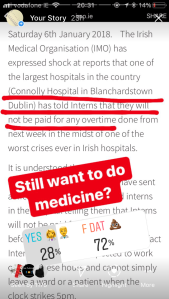There is a hospital crisis in many places in Europe and it’s quite bad in Ireland. It’s a complicated situation. In the midst of this, one of Dublin’s major hospitals decided they won’t pay interns overtime.
Some background. Interns work anywhere between an average of 45 and 80 hours per week in my experience. I assume the hospital will pay for the on-call time (i.e. scheduled overtime), but not overtime done on regular days.
A lot of people who follow my education platform are interested in medicine. I decided to ask a question:

First, it doesn’t help the doctors’ wages that people who want to do medicine are ok with working for free.
More interestingly, I found that there was a big divide between men and women. There is an all out war at the moment on whether this gap is at least in part explained by the choices that women make (e.g. 1 vs 2).
In the sample, there were 241 women and 57 men. The sex of 7 voters was unknown.
Of the men who voted, 82.4% said no. Of the women, 69.7% said no.
Surely this is contributing to the gender pay gap?
Of the yes voters, 12.0% were male. Of the no voters, 21.9% were male.

Why? Some theories. The ones that are highlighted are the ones I feel are more plausible.
- Women are more likely to agree to work for free
- Women value altruism more than men do (conflicting evidence on this, e.g. 1 vs 2 vs 3)
- Women value prestige more than men do (rebuttal: I think men tend to engage in costly signalling more than women)
- Women don’t have the foresight to understand what it is like to not get paid for work (rebuttal: I think this is subsumed by reason 6)
- Men perceive that they are valued by society based on their ability to earn, not based on their job title (rebuttal: men chase after medals and value the concept of fighting for their country. There is no major monetary reward for that. Similar to number 3)
- Women are more optimistic about being able to enact change should they themselves be in an unfavourable situation
- Women don’t intend to stay in medicine for the rest of their lives (rebuttal: that’s not impossible, but it doesn’t explain why they would go into at all)
- Women don’t see their job as their only income (similar to the above point)
Problems:
- Self-selection: people who follow a service that helps to do especially well in school do not necessarily represent the general population
- This is a survey, hence the answers are more about one’s projections than actual behaviour
- Internalised gender roles: women are supposed to care more about helping others than money, therefore in a survey, they will answer “yes” (this is somewhat subsumed in reason 2)
- The sample in mostly women, so men’s answers have less statistical power
- The sample is small
- The voters lack context
- The way I phrased it may have put people off medicine, or indeed made them more righteous in voting yes.
Did you see that there’s now a Gay Pay Gap??? Here’s an amusing chart:
https://www.theatlas.com/charts/B1we6i4WM
LikeLiked by 1 person
P.S. na-na-nah-na-na-nah 😀
LikeLike
I was waiting for that…
LikeLiked by 1 person
What an amazing website, thanks
LikeLiked by 1 person
Female rep on boards:

LikeLike
Women are more responsible than men…😳
LikeLike
I think you needed to state your hypothesis first and then determined when it either was found plausible or rejectable. Is it is, you did a survey and then tried to bolt rationals to it to explain your results.
So, try again, explicitly stating, from the outset, what theory you intend to expose. Your low P is favorable, but, you’ll need to perhaps ask three similar questions in order to correlate the response given the biases you’re trying to draw out.
LikeLike
H0 = there is no difference between the attitudes of men and women to doing unpaid overtime. H1= there is a difference. Failed to reject H0 🤓
LikeLiked by 1 person
I quit blogging because in a way it isn’t the most rewarding of activities. Its blind leading the blind and a subset of the self help genre
LikeLike
Alternative is getting $0 for 0 fucks.
LikeLike